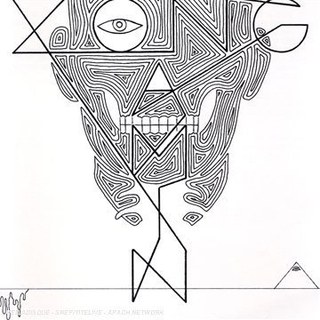Though the critics will smirk when comparing Japan’s Zongamin to Godzilla, if the ensemble were reptilian in any way, it would be more accurate to call them chameleons.
“Ensemble” is also a very misleading term. While supported by a number of backing players on this self-titled full-length, Zongamin is essentially Susumu Mukai, a trained illustrator and artist with an obvious knack for crafting a unique blend of dance music, rock, and electronica. For lack of a better word — or in an attempt to put a brand-name on it — the record could arguably be called one of the first documents of “post-disco.”
Ever the chameleon, however, Mukai manages to take us in just 12 songs on a drug-induced roller coaster ride through all that modern electronica has to offer, and then some. Trying to peg down distinct or defining moments is like racing someone through a museum and then later asking them for a dissertation on Renaissance painting: what sticks are merely the passing impressions.
The album-opening Arrows cover “Make Love Not War” could even make the machines of Servotron drool. It’s an upbeat rock number with a scope and speed that could be linked to Devo as easily as it could be to modern surf rock. It’s followed by the bass-heavy Atari grooves of “Serious Trouble,” which hints at Trans Am.
The beginning of “Street Surgery 2” is a hybrid of Tortoise circa Standards and the lighter colors on the palette the Dust Brothers used in Fight Club. Carried along by a simple electronic drum beat and a turntable, the song makes random guitar noises and sound samples running in reverse all sound vaguely like a distorted sitar.
“Spiral” and “Double Dostiev” could be outtakes from Trans Am’s Futureworld period, percussion-heavy exercises not dissimilar from “Serious Trouble” that toy with the marching rhythms of 4/4 time. On “J. Shivers Theme,” Mukai lends an eerie whistle to vaguely Latin choruses, complete with bongos, tambourines, and trashy guitars. Though you thought you’d never hear this, it’s Esquivel and Ennio Morricone laughing while they toss back a cold one.
The funk factor is cranked up to 11 Turtletoes-style on “Painless” and “Tunnel Music,” both capable of driving even the most straight-laced suit-and-tie businessman to sport some bright polyester slacks and wear a little coke spoon around his neck. The electric guitars, bass, and hand-claps of “Tunnel Music” are so funky, you almost feel guilty for enjoying it without laughing or dropping reference to Mr. Dirk Diggler.
The record, though, is not without its more aggressive and straight-forward moments. “Whiplash” is the most band-oriented piece on the record, a stripped-down but colorful punk number that depends mostly on the interplay of bass, drums, and occasional stabs of guitar. Think of Skin Graft’s Yona Kit, and you’re not far from a decent point of reference.
Songs like “Whiplash,” however, are further offset by more abstract and ambitious electronica like “Trespasser,” which hints at the work of Oval; “New Song To An Old Story,” which could have been taken straight off Millions Now Living Will Never Die; and “Mummies,” the horror movie theme closer.
The real question, though: Is it any good?
It’s one thing to be able to put together a record that feels like a patchwork or compilation of ambitious dance music and electronic fare. It’s another to have that work sell itself as an inventive work of original music. Zongamin’s full-length debut seems to prove itself on both fronts. Mukai is not always reinventing the wheel with his songs, but they still each seem to carry a clear vision and an oddly distinct sound.
What’s most amazing about the record is how much of it is put together in the most basic and organic terms. Listen to it more than twice through, and you start to realize just how few electronics Mukai uses in his electronic dancescapes.
The rock fanatic who likes their music with lyrical verses, big choruses, and clear accent marks over the distorted guitar might have difficulty warming up to this cold-blooded chameleon. If you give the record a chance, though, it’ll never leave your CD player. – Delusions of Adequacy, April 28, 2003




